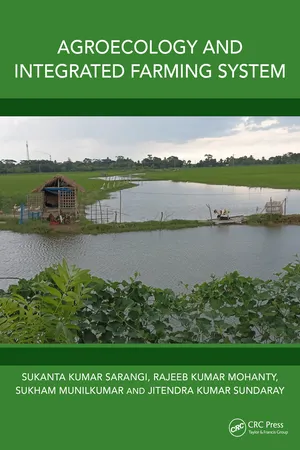
Agroecology and Integrated Farming System
- 384 pages
- English
- ePUB (mobile friendly)
- Available on iOS & Android
Agroecology and Integrated Farming System
About this book
In most developing countries, agriculture has grown from merely an art to a science, but it does not yet maximize its business potential. In these countries, subsistence farming dominates, and farmers face the increasing impact of climate change and natural disasters. An integrated farming system (IFS) model yields minimum risk and maximum environmental benefit. The latest cutting-edge technologies applicable to each component of IFS and the science behind an agro-ecological approach are discussed at length in this book, which takes a holistic approach towards sustainable agricultural production technologies that result in maximum profit for the farming community. Also, it considers practices that care for natural resource bases and leave behind minimal environmental footprints. To keep prepared for climate change and natural disasters, appropriate contingency measures to tackle these unwanted situations are detailed.
The book offers comprehensive coverage of the most essential topics, including:
- Modern technologies, new concepts and innovations such as 3D farming, Integrated System of Rice Intensification (ISRI), hydroponics, rooftop farming and water budgeting.
- The use of IT for supporting IFS and environmental aspects related to greenhouse gas (GHG) emission.
- Information on organic farming covering all its aspects, present situation, market-related issues and future options.
- In-situ input generation procedures that are integral to recycling and their effective reuse.
- Region-specific IFS models based on soil, climate and farmers' requirements for different agroclimatic situations.
- IFS management aspects including water harvesting, conservation, increased productivity and drainage
- Latest information on the socio-economic factors, impacts, government orientations, policy framework towards agriculture and environmental aspects, and the future road map to make IFS a success.
This book will serve as a handy reference for academics, researchers, students, progressive farmers and policymakers aiming to make agriculture more resilient, sustainable and eco-friendly.
Frequently asked questions
- Essential is ideal for learners and professionals who enjoy exploring a wide range of subjects. Access the Essential Library with 800,000+ trusted titles and best-sellers across business, personal growth, and the humanities. Includes unlimited reading time and Standard Read Aloud voice.
- Complete: Perfect for advanced learners and researchers needing full, unrestricted access. Unlock 1.4M+ books across hundreds of subjects, including academic and specialized titles. The Complete Plan also includes advanced features like Premium Read Aloud and Research Assistant.
Please note we cannot support devices running on iOS 13 and Android 7 or earlier. Learn more about using the app.
Information
Table of contents
- Cover
- Half-Title
- Title
- Copyright
- Contents
- Preface
- Foreword
- About the Authors
- Chapter 1 Integrated Farming System: Concept, Components and Integration
- Chapter 2 Sustainable Integrated Farming Systems for Food and Nutrition Security
- Chapter 3 Integration of Enterprises and Efficient Resource Use in Diverse Farming Systems
- Chapter 4 Application of Information Technology for Advanced IFS: R&D and Integration of Modern Tools, Including Artificial Intelligence
- Chapter 5 Modern Tools for Greenhouse Gas Emission Estimation and Mitigation in IFS
- Chapter 6 Organic Farming Systems
- Chapter 7 In Situ Resource Generation, Nutrient Management, ITK and Use for IFS
- Chapter 8 Impact of Climate Change on Agriculture and Adaptations through IFS
- Chapter 9 IFS Models for Different Agro-climatic Zones
- Chapter 10 High-Value Aquaculture, Agribusiness Options and FPOs
- Chapter 11 Agroecology and Biodiversity
- Chapter 12 Rainwater Harvesting and Management for IFS
- Chapter 13 Socioeconomic Impact of Integrated Farming Systems (IFS)
- Chapter 14 Road Map for the Future: Doubling Farmers’ Incomes
- Chapter 15 Policy Framework Requirements for the Success of IFS
- Index